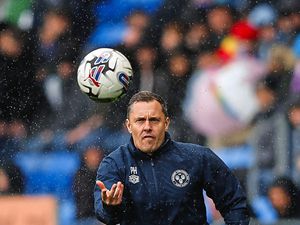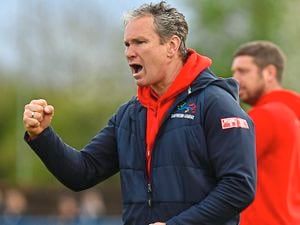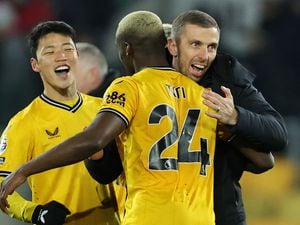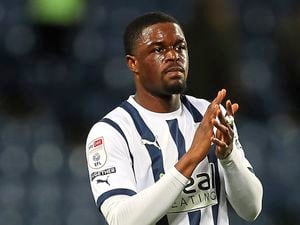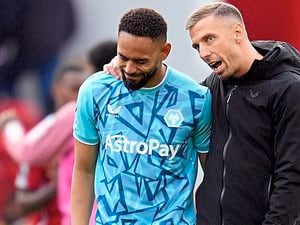Simon Osborn still at a loss to explain why Wolves continually fell short
It was Molineux at its most feral and atmospheric best.
Ninety-plus minutes of impassioned and sustained support – singing, shouting, screaming – straining every sinew to try and push their team over the line.
The second leg of the 1997 Championship play off semi-final. Wolves against Crystal Palace.
The backdrop for such a frenzied evening perhaps explained why there was so much nervous excitement floating around the famous old stadium in search of one of those truly special nights.
Wolves, a team seemingly destined - or more to the point desperate - for the Premier League had been stung by controversial play-off defeat against Bolton two years earlier, not to mention Aldershot slightly lower down the pyramid a few years before that.
And then there was the first leg at Selhurst Park.
A goal down with a minute left would have been a fairly reasonable return to take back to Molineux, only for Palace substitute Dougie Freedman to notch a second.
Hold on though. Defender Jamie Smith – he and Freedman would actually swap clubs five months later – stormed up the other end to gleefully despatch his first ever Wolves goal.
2-1. That’ll do. Even an away goal now as well.
But no. There was still somehow enough added time remaining for Freedman to produce an exquisite lob to restore the Eagles’ two-goal cushion and once again leave Wolves with a mountain to climb.
Yet even in adversity, those Wolves fans who were starting to become accustomed to an interminable delay in taking that final leap off from the god-forsaken Championship gave it their absolute all on an incredible occasion under the Molineux lights.
So too did the players, Mark Atkins raising hopes of a dramatic comeback by tucking home a neat pass from Geoff Thomas on the half hour mark.
Sadly though the Scotch mist returned as David Hopkin drew Palace level midway through the second half and, even though an Adrian Williams header gave hope five minutes from time, it was to be another of those painful hard luck stories for which Wolves had become famed.
All that atmosphere, all that passion, all that noise. All that was missing, was the result.
Simon Osborn, formerly of Palace, occupied the Wolves midfield for both legs of that semi- final.
Even in ‘defeat’ – the 2-1 win meant nothing when it came to play-off progress - the cultured midfielder still recalls this excruciating hard luck story as one of his more memorable Molineux nights.
“The aim was to get to Wembley, and games like that, with so much at stake, are always special,” Osborn recalls.
“And I loved playing under the floodlights at Molineux, the atmosphere always seemed that little bit different.
“We were really revved up to go out and get the result, even though there was obvious disappointment at conceding that third goal at Palace which had given us plenty to do.
“We still felt if we could get an early goal we might be able to steamroller them, and we did get in front half an hour in.
“Their equaliser made it so difficult, and even though we got back ahead we just couldn’t get a third to take it to extra time.
“We gave it everything that night, we were just exhausted by the end and could do no more.
“With what was the end goal up for grabs that night, and the whole occasion, it was certainly the best atmosphere I played in at Wolves.”
That 96/97 season in particular had brought so many big games and big results, finally suggesting that the Holy Grail of the Premier League was within Wolves’ grasp.
Steve Bull’s opening day hat trick at Grimsby, the double over West Bromwich Albion including Iwan Roberts’ treble at The Hawthorns, Bully’s late winner – from an Osborn assist – at Sheffield United.
It was quite a squad at that time.
The firepower of Bull, Roberts, Don Goodman; the goalkeeping and defensive experience of Mike Stowell, Keith Curle, Andy Thompson, Mark Venus; the midfield nous of Osborn, Thomas, Atkins, Steve Corica and Neil Emblen; the emergence of young talent such as Smith and Dean Richards.
And then in the following years, the likes of Kevin Muscat, Steve Froggatt, Steve Sedgley, John De Wolf, the development of Robbie Keane, Joleon Lescott, Lee Naylor, Carl Robinson.
As ever it begs the question, the million dollar question, which has probably been asked a million times.
Just how, with that array of talent and experience within the ranks, did those groups of players in the mid-to-late Nineties not manage to make it across to the Promised Land?
There was an FA Cup run which Osborn featured in the memorable quarter final win at Leeds only to be suspended for the semi-final with Arsenal which impacted on league results the following season, and a couple of seventh-placed finishes in the two after.
Frustrating times as both Mark McGhee and Colin Lee took Wolves to the brink of promotion. But it never quite happened. Why not? Counsel us, Ozzy!
“I really don’t know, and I have been asked this question many times as you can imagine,” he replies.
“We were so close on several occasions both in that play-off year and one or two seasons that followed, but we’d get on a decent run and then somehow shoot ourselves in the foot.
“We couldn’t quite get it right, and it turned out there were one or two other bits and pieces going on behind the scenes although we weren’t massively aware of those at the time.
“Mark left and Colin came in, so there was a bit of a change-around, and it felt like we should have been challenging more than we were.
“But I can’t put my finger on just one reason why it didn’t happen, it was maybe just little moments in seasons, a week or two when we weren’t quite at it and couldn’t get back into our stride after a poor result.
“Sometimes there are seasons when lady luck is on your side, or goes against you, and it’s not excuses but we couldn’t get over that final hurdle.
“We had a great squad mixed with experience and fantastic young lads coming through, the dressing room was strong and we got on well.
“It was just that consistency that you need to push on to get to the Promised Land that we couldn’t find – that was what let us down in the end.
“Many of us involved still speak about that particular time when we meet up, thinking back to some of the football we played and wondering how we didn’t do better.”
Osborn was no stranger to high expectation levels and the big occasion, long before setting foot inside Molineux.
A Spurs fan growing up thanks to an admiration for later Wolves boss Glenn Hoddle, he was snapped up by Palace, the nearest club to his Croydon roots, at the age of 16.
Having progressed through to the first team - his full debut came against Liverpool at Anfield - he was around the squad although didn’t feature in the 1990 FA Cup Final against Manchester United, came off the bench on the first ever Premier League weekend to score a last minute equaliser in a 3-3 draw against Blackburn, and also netted in the League Cup semi-final first leg defeat to Arsenal later in that season.
Osborn was also part of the Palace team which responded to relegation from the Premier League by immediately winning the First Division title, before then moving to Reading.
“Having signed an apprenticeship straight from school at 16, and gone on to turn pro, to come on in my first ever Premier League game and score the equaliser…you couldn’t write it,” Osborn recalls.
“I managed to make steps up as I went along, and in those days in reserve games you would come up against experienced pros coming back from injury so I remember playing against the likes of Kenny Sansom and others who you could learn from.
“I was fortunate to be play alongside some great players as well, including Geoff Thomas who later came to Wolves, and I enjoyed it at Palace, although eventually I moved on because I needed to play more football.”
It was McGhee, later to take Osborn to Wolves, who signed him for Reading at the start of the 1994/95 campaign, which would begin, ironically enough, at Molineux.
All who were there will remember the ‘Neil Emblen fixture’, as Osborn’s great mate launched his Molineux career by stepping on the ball before later, Froggatt’s goal secured a perhaps undeserved Wolves win.
Osborn would then score against Wolves in a 4-2 Royals victory just before Christmas, but agonisingly Reading, who finished 2nd in the league in the season when the Premier League was being reduced in numbers, had to go into the play-offs and were beaten in the final by a Bolton side who had come through a particularly controversial semi-final. The less said of that one the better!
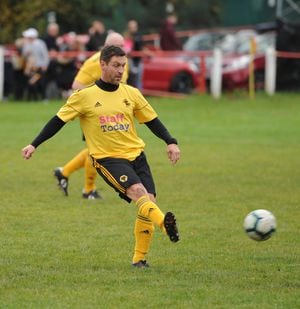
With Reading having missed out on promotion, Osborn was still able to enjoy a second crack at the Premier League when signed by Ray Wilkins at QPR, but the switch to Loftus Road didn’t really work out.
By this time McGhee, who had left Reading midway through that play-off season to join Leicester, had moved again, to Wolves, and quickly had Osborn in his sights.
“I thought QPR was the right club at the time but it didn’t work out and then Mark wanted to sign me at Wolves,” Osborn explains.
“I came up and met him, chatted about the squad and looked around the stadium, as it was the biggest change for me geographically, moving up to the Midlands, in my career so far.
“Once I saw what Wolves was about, and saw the place, it was a no-brainer and I signed instantly.
“It was good to work with Mark again, and the club had huge potential to go on and reach the Premier League, but unfortunately it just didn’t happen during my time.”
There were however many highlights during Osborn’s 185 Wolves appearances which featured 14 goals, including some impressive free kicks.
His favourite of those goals? His first ever for the club, against Watford, a searing long range effort from outside the box.
He was also a regular provider of assists, with his preferred choice from that particular back catalogue the one which sent Bull away for a last gasp Molineux winner against Birmingham City.
“I was that tired by that stage of the game I don’t know how I kicked it that far!”
And his best game, atmosphere against Palace aside? The 4-2 local derby win away at Albion.
It was by the time that Dave Jones was in charge that Osborn actually moved on from Molineux, playing the first three games of the new manager’s reign before heading on loan to Tranmere as he looked to reshape the squad.
Osborn had no complaints, and Jones allowed him back to train to get in shape the next pre-season before being joining Port Vale, but it was a proud Wolves career that was coming to an end, including a spell as club captain.
He has previously described himself as ‘marmite’, a player some fans loved and others did not, perhaps due to his propensity to take a risk on the ball in a bid to make things happen.
Osborn would also, like many, play through injuries, and a knee problem which affected him over the closing months of that 1996/97 campaign was one which eventually needed surgery and delayed his involvement for the following season.
“I think the way that I played the game, you needed to have that self-belief,” he says.
“There were periods in my career when I was struggling a bit with injuries, including that season of the Palace play-off, but I wouldn’t look to use that as an excuse or want any pats on the back.
“Yes I had a knee problem, but I managed it, and when you are part of a team pushing for promotion you don’t want to come out.
“I was probably training, at most, once a week, and with the games coming thick and fast I’d be having my treatment, the doctors would be sorting me out and I’d be taking the tablets.
“I am not sure any player is ever completely at 100% once you are reach the middle to end of a season, but I’d have loved to have been a little bit better, although if I felt it was influencing me in regard to not being able to contribute then I would definitely have not played.
“Our aim was to try and get promoted, and I wanted to do everything I could to play my part in that.
“I was never one of those guys who would hide away whether I was injured or not playing particularly well, and maybe that was to my detriment.
“You have to believe in what you are doing, and have belief in your team-mates within that, and they all knew how I would play.
“So they would give me the ball in tight situations and back me to get out of jail and maybe that is why I was able to chip in with some assists where I was prepared to take risks and fail if they didn’t come off.
“One thing I never did was to change, if things weren’t going right.
“Maybe there were times I could have kept things simple if it wasn’t going well, but I couldn’t change the way I played.
“The make-up of a player like me is that you have to have confidence in what you want to do, even knowing not everyone was necessarily going to like it.
“That’s football, it’s all about opinions, but so long as I was doing what I should for the team, I never had any fear.
“And when I talk about whether fans liked me or they didn’t, I would always like to think I was personable enough to chat to people during my time at Wolves.
“If I was out with my wife for a meal, often we would meet fans and if someone had an opinion that I hadn’t played particularly well I was always happy to chat as long as it was civil.
“I was always happy to speak to people, that is part and parcel of being a footballer, to give your time, and for me it was never a problem.
“And I have to say, I really enjoyed my time at Wolves.
“Most of the players lived in the local area and we would socialise with our wives away from the football.
“Both of my children were born in Wolverhampton, and I have nothing but fond memories of my time, and to be club captain in particular was a great honour.”
Osborn had moved on by the time Wolves endured another bout of play-off misery at the hands of Norwich before redemption duly arrived on an incredible afternoon in Cardiff.
After a spell with Gillingham Osborn was re-united with Colin Lee at Walsall, where he would chalk up over 100 appearances in three years, later taking on some coaching duties when Paul Merson was at the helm.
A solitary appearance for Graham Turner at Hereford later followed, before the Osborn family – with wife Billie-Jo, son Teddy and daughter Karis - moved back south for family reasons, and he continued to turn out in non-league until he was 42.
The final years of his career also included several coaching and managerial positions, including with Bromley and Margate, before opting for a different career.
“I did enjoy coaching, and I still do a bit on a Monday evening around by me with Bobby Bowry, who I played with at Palace all those years back.” Osborn recalls.
“I still love it, but maybe it was wasn’t the right time for me when I finished playing and nothing really materialised so I had to take a different pathway.”
Starting off working for a small air conditioning and electrical business, Osborn learned his new trade and has since worked his way through the ranks as site manager and now project manager for RI Design and Build, a construction company based in Bromley.
“We build houses and commercial units, and it’s a bit of a change from football, although some things are still the same,” says Osborn.
“It’s about people and processes, similar to football, and it’s about how you get on with people and do what you can to make sure things run smoothly.
“It’s about being able to get on with everyone from Managing Directors to the labourers cleaning out the sites, treating everyone with the respect they deserve and then hopefully they look at you in the same light.
“For me the approach is the same as during my football career, I haven’t changed, and I wouldn’t expect anyone else to do something that I’m not prepared to do.
“I am enjoying it, and will keep doing it for a few more years, until hopefully I can win the Lottery and retire somewhere nice!”
Football is still never too far away for Osborn. He still plays the odd charity game including travelling to represent the Wolves Allstars when possible, and retains a keen eye on the Premier League and particularly his old clubs Wolves and Palace.
As to their latest meeting coming up on Friday night, he fancies Wolves to potentially have more goals in them but is well aware of the organisational prowess the Eagles will display under Roy Hodgson and Ray Lewington.
“Palace have been in the Premier League more than Wolves in recent years but Wolves under Nuno are definitely a club on the up with so much attacking energy and pace in the team,” he suggests.
“People often used to ask me what I thought might happen had we beaten Palace and gone on to win the play-offs that season, and my answer is that Wolves might have been a yo-yo club for a few years.
“There were plans in place to try and improve the training facilities, but I’m not sure the overall foundations of the club were ready to be a sustained Premier League force.
“Wolves and the fans have had their hardships down the years but now they are reaping the rewards of having those training facilities, the increased investment and now the club is on its way.
“They’ve had a great few years and have let a few players go in the window but have bought in others and are maybe changing things around a little but they are clearly heading in the right direction.”
Osborn’s continuing football links are also headed in a different direction, with son Teddy a Level 5 referee currently working towards his Level 4 qualification.
Living in a region where former Premier League referee – and Wolves’ play-off final referee – Steve Bennett is on hand to offer advice and guidance, Osborn admits it has made him look at officiating in a different light!
“Teddy has been around football a long time, and one of his big positive traits is that he is able to relate to players and doesn’t get phased when he is out in the middle,” says a very proud Dad!
“He is working his way up the ranks, and I am sure as long as he is enjoying it he will carry on and hopefully at some point he might make it right the way up the leagues.
“It has made me see refereeing in a completely different light, and realise how hard the job is, especially when I have gone along to watch and he is out there getting grief from coaches and spectators.
“When I played, we always appreciated referees and had professional respect for them but at the same time you do try and gain an advantage every now and again!
“The lower down you get the harder it is but Teddy is doing well so far and long may that continue.”
With no supporters currently permitted inside Molineux it will certainly be a very different atmosphere on Friday night to that memorable play-off tussle over 23 years ago.
But if Teddy does continue his refereeing career and progress up the footballing ladder, and needs a bit of advice on what it’s like to experience a frenetic white-hot atmosphere in front of nearly 30,000 people, he won’t have to look too far to find out.

